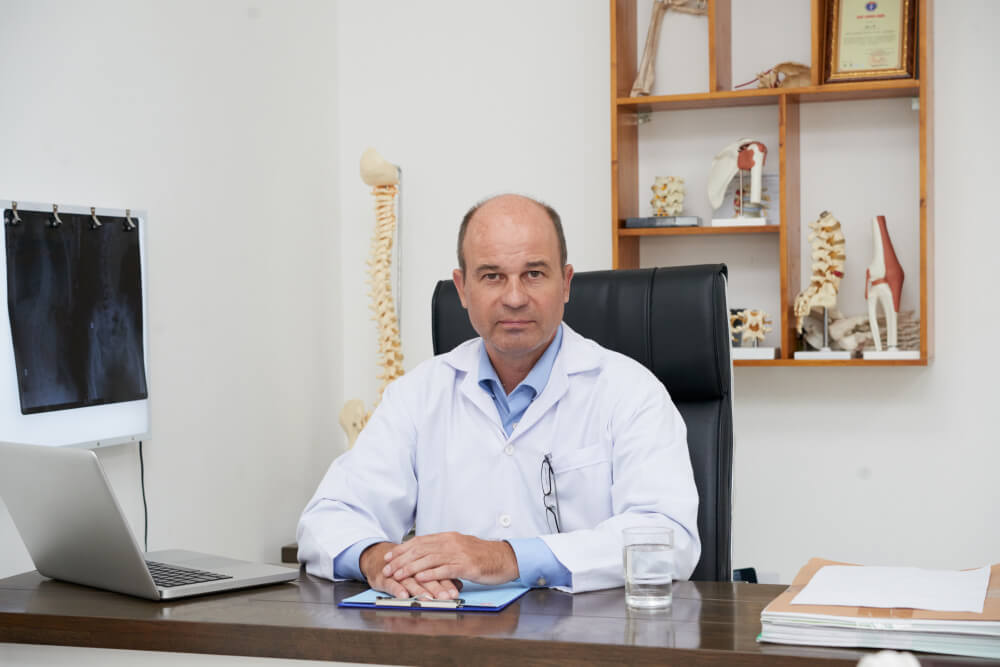Orthopedic Doctor For Complete Cervical Spine Health Treatment
The cervical spine, or neck, is a complex structure that supports the head and allows for a wide range of motion. When the cervical spine is injured or diseased, it can lead to neck pain, stiffness, and other debilitating symptoms. Orthopedic surgeons specialize in diagnosing and treating conditions affecting the cervical spine, offering a range of treatment options to help patients regain their quality of life.
Common Cervical Spine Conditions
Several conditions can affect the cervical spine, including:
- Cervical Spondylosis A degenerative condition that causes wear and tear on the spinal discs and joints.
- Herniated Disc A condition in which the soft center of a disc bulges or ruptures, putting pressure on the spinal nerves.
- Spinal Stenosis Narrowing of the spinal canal, which can compress the spinal cord and nerves.
- Whiplash A neck injury caused by sudden acceleration or deceleration, often resulting from a car accident.
- Neck Strain A common injury caused by poor posture, repetitive stress, or sudden movements.
The Role of Orthopedic Surgeons
Orthopedic surgeons play a crucial role in diagnosing and treating cervical spine conditions. They can:
- Conduct a Physical Examination Assess your range of motion, strength, and pain levels.
- Order Imaging Tests Use X-rays, MRI, or CT scans to diagnose the underlying condition.
- Develop a Treatment Plan Create a personalized treatment plan tailored to your specific needs.
Non-Surgical Treatment Options
In many cases, non-surgical treatments can effectively manage neck pain and improve function. These treatments may include:
- Physical Therapy Exercises and therapies to strengthen the neck muscles and improve flexibility.
- Medications Pain relievers, anti-inflammatory medications, and muscle relaxants.
- Traction A technique that involves stretching the neck to relieve pressure on the nerves.
- Lifestyle Modifications Adjustments to daily activities, such as posture and ergonomics, to reduce stress on the neck.
- Hot and Cold Therapy Applying heat or cold to the neck to relieve pain and inflammation.
Surgical Treatment Options
In some cases, surgery may be necessary to treat severe cervical spine conditions. Common surgical procedures include:
- Discectomy Removal of a herniated disc.
- Laminectomy Removal of a portion of the lamina, a bony structure that covers the spinal cord.
- Spinal Fusion Fusing together two or more vertebrae to stabilize the spine.
- Artificial Disc Replacement Replacing a damaged disc with an artificial disc.
Rehabilitation After Surgery

Rehabilitation is an essential part of the recovery process after cervical spine surgery. Physical therapy can help you regain strength, flexibility, and range of motion.
- Physical Therapy Exercises Your physical therapist will prescribe exercises to help you recover.
- Gradual Return to Activity You will gradually increase your activity level over time, starting with gentle exercises and progressing to more challenging activities.
- Follow-up Appointments Regular follow-up appointments with your orthopedic surgeon are important to monitor your progress and address any concerns.
Preventing Neck Pain
While it is not always possible to prevent neck pain, there are steps you can take to reduce your risk:
- Good Posture Maintain good posture when sitting, standing, and sleeping.
- Regular Exercise Regular exercise can help strengthen the neck muscles and improve flexibility.
- Ergonomic Workplace Ensure your workplace is ergonomically designed to prevent strain on your neck.
- Stress Management Stress can contribute to neck pain, so it’s important to manage stress effectively.
- Avoid Overuse Avoid activities that involve repetitive neck movements.
Choosing an Orthopedic Doctor
Selecting the right orthopedic surgeon for your cervical spine care is crucial. Consider the following factors:
- Experience and Expertise Look for an orthopedic surgeon with experience in treating cervical spine conditions.
- Board Certification Ensure the surgeon is board-certified in orthopedic surgery.
- Patient Reviews Read reviews from other patients to get a sense of the surgeon’s reputation and quality of care.
- Hospital Affiliation Choose a surgeon who is affiliated with a reputable hospital.
- Consultation Schedule a consultation with the surgeon to discuss your needs and expectations.
Neck pain can significantly impact your quality of life. By seeking prompt medical attention and following your doctor’s recommendations, you can manage your condition and improve your mobility. Orthopedic surgeons play a vital role in providing specialized care for cervical spine conditions, helping you regain your independence and enjoy life to the fullest.
Contact our clinic’s Orthopedic doctor for Cervical spine treatment (432) 322-8675 Or visit us https://orthoxpress.co/

